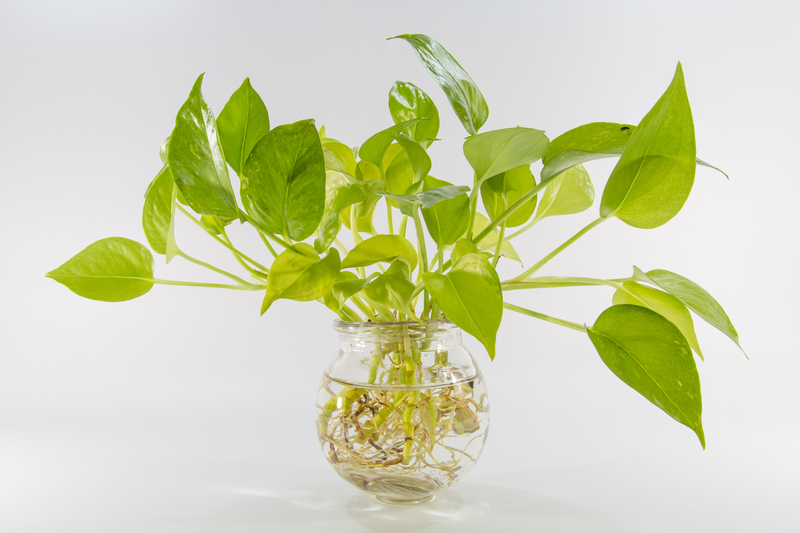Harvesting Richness: How Organic Waste Becomes Vital Soil
Posted on 28/08/2025
Harvesting Richness: How Organic Waste Becomes Vital Soil
In the ceaseless cycle of nature, nothing goes to waste--especially when it comes to organic matter. As the world grapples with mounting garbage and depleted soil quality, understanding how organic waste transforms into vital soil is paramount. Through composting and natural decomposition, kitchen scraps, grass clippings, and even autumn leaves are reborn as a powerful resource for plants, gardens, and the planet itself. Let's explore the fascinating journey from organic trash to eco-friendly treasure, and uncover how anyone can take part in harvesting this richness.

What is Organic Waste?
Before diving into transformation, it's crucial to define organic waste. Essentially, this term refers to any material that originated from living organisms and can be broken down by microorganisms. Organic waste commonly includes:
- Fruit and vegetable peels
- Eggshells
- Grass clippings
- Leaves and twigs
- Coffee grounds and filters
- Paper towels and napkins (unbleached)
- Food scraps
What distinguishes organic refuse from other garbage is its unique ability to naturally decompose and nourish soil--a process at the heart of harvesting soil richness sustainably.
The Magic of Decomposition: Nature's Recycling Program
Organic decomposition is nature's way of recycling matter. When you toss a banana peel onto a compost pile, a team of microscopic organisms, earthworms, insects, and fungi quickly go to work, breaking the material down into simpler compounds. This process generates humus--a nutrient-packed, dark crumbly material known as vital soil.
Key Players in the Decomposition Process
- Bacteria: These microbes kick-start the breakdown, digesting simple sugars and proteins.
- Fungi: Molds and mushrooms help decompose tougher fibrous materials like cellulose and lignin.
- Actinomycetes: Not to be outdone, these soil bacteria tackle even more complex compounds, contributing to that earthy aroma of good compost.
- Invertebrates: Earthworms, beetles, and other small critters physically process organic debris, aerating the soil and helping mix nutrient material.
The combined work of these natural recyclers transforms organic debris into a rich, vital soil, ensuring nothing goes to waste in the web of life.
Harvesting Soil Richness: The Composting Process
At the heart of turning organic refuse into rich soil lies the age-old practice of composting. This process can be as simple as a backyard pile or as sophisticated as a commercial operation. Here's how anyone can start:
1. Collecting Organic Waste
- Maintain a small bin for kitchen scraps
- Regularly gather leaves, pruned branches, and grass clippings
- Avoid meats, dairy, and oily foods, as these can attract pests and slow decomposition
2. Balancing Greens and Browns
For successful organic waste-to-soil transformation, balance is key. Materials are classified as:
- Greens: Nitrogen-rich matter such as vegetable peels, coffee grounds, and fresh grass.
- Browns: Carbon-heavy material including dried leaves, cardboard, and straw.
The magic ratio? Aim for roughly 2 parts brown to 1 part green. This mix ensures the compost stays aerated and heating up--a vital step in killing pathogens and weed seeds while speeding up decomposition.
3. Aeration and Moisture
Like all living systems, compost piles need fresh air and moisture. Regularly turning the pile introduces oxygen, which:
- Feeds beneficial aerobic microbes
- Prevents foul odors from anaerobic decomposition
- Speeds up the breakdown process
Keep the compost as moist as a wrung-out sponge--neither soggy nor bone dry--for optimal conversion of organic waste into fertile earth.
4. The Waiting Game: When is Compost Ready?
Depending on climate, materials, and management, compost can become mature vital soil in three to twelve months. You'll know it's ready when:
- The pile looks, feels, and smells like rich soil
- The temperature cools back to ambient levels
- No recognizable food scraps remain
Benefits: Why Convert Organic Refuse Into Vital Soil?
Why is this cycle so important? The transformation of organic residues into living soil offers a host of advantages, for both people and the planet:
1. Improved Plant Health & Productivity
The humus produced through composting is a nutrient powerhouse, containing:
- Nitrogen, phosphorus, and potassium (key plant nutrients)
- Trace minerals like calcium, magnesium, and zinc
- Beneficial microorganisms that suppress plant disease
When incorporated into gardens or fields, this enriched soil helps plants develop deep roots, robust growth, and greater resilience against drought, pests, and disease.
2. Boosted Soil Structure and Water Retention
The organic matter in compost enhances soil structure--improving aeration for plant roots, promoting beneficial insect life, and helping the soil hold onto precious moisture during dry spells. By preventing erosion and supporting earthworm populations, compost helps create a self-sustaining ecosystem beneath our feet.
3. Reduced Landfill Impact
A staggering portion of municipal waste consists of food scraps and yard trimmings. By converting these to rich soil, we:
- Divert organic waste from landfills
- Reduce methane--a potent greenhouse gas produced by anaerobic landfill decomposition
- Lower the environmental footprint of waste management
Every household that composts organic matter becomes a powerful agent of sustainability--supporting local agriculture, reducing emissions, and minimizing pressure on landfill space.
4. Closing the Nutrient Cycle
Composting allows us to return nutrients to the earth, closing the loop of food and agriculture. This circular approach is a central pillar of regenerative agriculture and eco-friendly living. Rather than extract and discard, we replenish and restore.
Different Approaches to Turning Organic Waste Into Soil
People worldwide employ various methods to harvest soil richness from organic refuse. Here are some of the most effective and popular:
Backyard Composting
- Hot composting: Piles reach 130-160?F to kill weed seeds and pathogens quickly
- Cold composting: Requires less effort--just pile material and wait several months to a year
Both types result in nutrient-rich finished compost perfect for home gardens, lawns, and trees.
Vermicomposting (Using Worms)
Worm composting employs red wigglers to gobble up food scraps and expel castings. These castings form some of the richest organic matter known, overflowing with beneficial microbes and nutrients.
- Easily done in small spaces--excellent for apartments
- No turning or heavy labor required
Bokashi Composting
Originating from Japan, bokashi uses beneficial anaerobic bacteria and a sealed bin to ferment kitchen scraps rapidly. While bokashi "pre-compost" requires further burial or finishing in soil, it allows for the breakdown of items like meat and dairy--normally forbidden in backyard piles.
Municipal and Industrial Composting
- Large-scale facilities process thousands of tons of organic waste weekly
- High temperatures and special aeration systems speed the breakdown
- Finished compost supplied to farmers, landscapers, and city projects
These operations are critical for diverting urban organic refuse and supplying commercial volumes of soil-enriching compost.
Common Problems and How to Solve Them
Sometimes, converting organic waste into vital soil doesn't go as planned. Here are some of the most frequent issues and their simple solutions:
- Odor: Foul smells indicate too much moisture or a lack of oxygen. Add dry browns, aerate, and check drainage.
- Pests: Avoid meat, dairy, and oils. Bury food scraps under a layer of brown material.
- Slow decomposition: Chop materials smaller, add greens if dry, and turn more frequently to speed up breakdown.
- Too wet/dry: Adjust with water or dry leaves as needed. Keep compost moist but not soggy.
With the right balance and attention, almost any household can transform kitchen waste into fertile ground--adding invaluable resilience and fertility to their corner of the world.
How to Use Finished Compost Effectively
Once your pile has broken down into rich soil, it's time to reap the rewards:
- Mulch: Spread around garden beds to retain moisture, suppress weeds, and moderate temperatures.
- Soil Amendment: Mix into vegetable or flower beds to boost soil organic matter and fertility.
- Potting Mix: Blend with sand, perlite, or peat for a nutritious base for houseplants and seedlings.
- Top Dressing: Sprinkle on lawns or under trees to renew tired soil and promote healthy growth.
With each application, you're giving back to the earth--closing the loop and ensuring ongoing soil vitality for future generations.
The Global Impact of Organic Waste Solutions
Scaling up the harvesting of soil richness from organic materials has potential to change the planet's future. Some key impacts include:
- Climate Benefits: Composting reduces methane emissions, sequesters carbon, and supports climate resilience by fostering healthy soils.
- Food Security: Returning nutrients to fields enables families and communities to grow more abundant, nutritious, and resilient crops.
- Urban Sustainability: Community composting programs create local jobs, reduce waste management costs, and support urban agriculture projects.
As more people and cities embrace the transformation of organic waste into essential soil, we move closer to a regenerative, sustainable future.

Conclusion: The Cycle of Life in Your Hands
The simple act of turning apple cores, coffee grounds, and grass trimmings into thriving soil is nothing short of miraculous. It's a testament to the richness that surrounds us--just waiting to be harvested. Whether you garden in a backyard or simply separate your food scraps for composting, you are part of a timeless, life-sustaining cycle.
Every handful of vital, living earth begins with organic waste and ends with new life. Join the movement and discover how easy--and rewarding--it is to transform your trash into treasure. With each compost pile, pile, and bucket, you're not just reducing waste--you're cultivating abundance for generations to come.
Frequently Asked Questions About Turning Organic Waste Into Soil
- What can't be composted? Avoid plastics, synthetic chemicals, diseased plants, cat or dog waste, and glossy papers.
- Does composting attract rodents? Properly balanced and managed compost (with greens buried under browns) shouldn't attract unwanted pests.
- Can I compost in the winter? Yes! While decomposition slows in cold climates, insulation and regular additions keep the pile active.
- How do I start if I live in an apartment? Try worm bins (vermicomposting) or bokashi fermentation--even a community compost drop-off program works.
- How much organic waste can I compost? Most households generate 1-5 pounds of compostable material weekly. Even small amounts make a big difference!
No matter how you get involved, remember: Harvesting richness is as simple as giving your organic waste a second life. The soil--and the world--will thank you.
Latest Posts
Transform Your Garden with Smart Weed Control Practices
Strategies for managing garden spaces with dogs
Precision Hedge Trimming for Perfect Gardens
Embarking on Transformation: First Steps for a Garden Makeover



